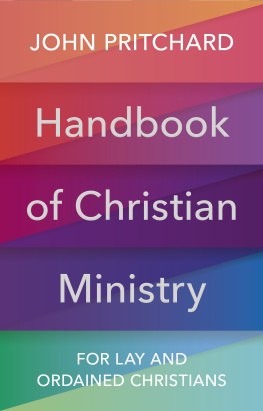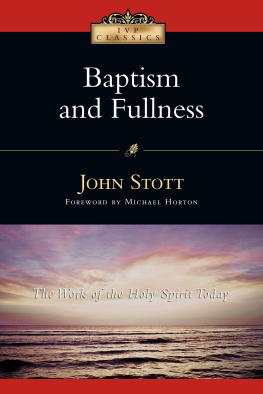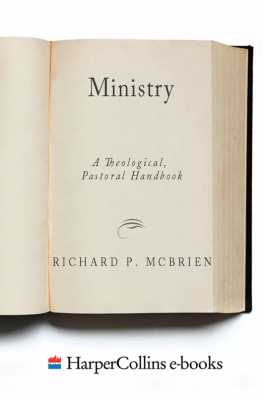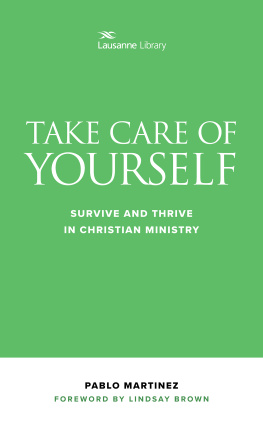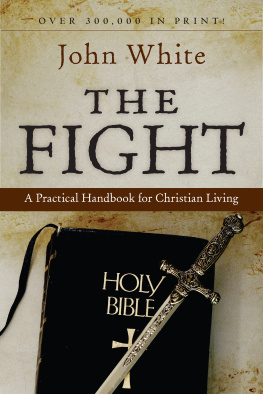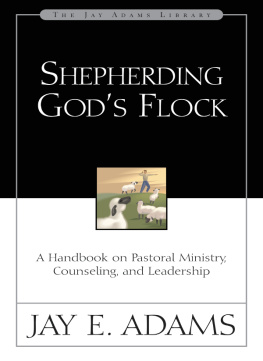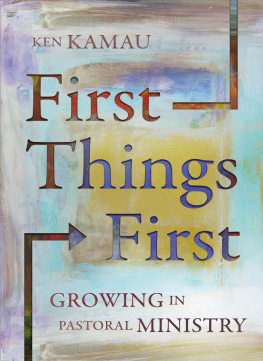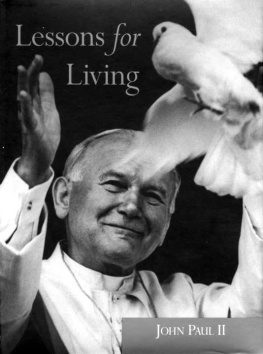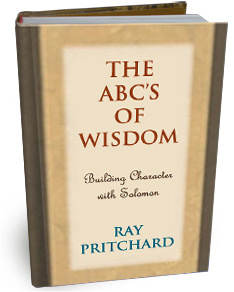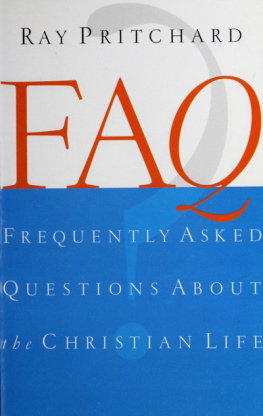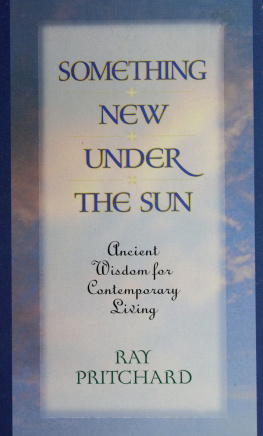
John Pritchard was Bishop of Oxford until his retirement in 2014. He was formerly Bishop of Jarrow and, before that, Archdeacon of Canterbury. He has served in parishes in Birmingham and Taunton, and was Warden of Cranmer Hall, Durham. He is the author of more than twenty books, including The Intercessions Handbook , Beginning Again on the Christian Journey , How to Pray , How to Explain Your Faith , The Life and Work of a Priest , Living Jesus , God Lost and Found , Living Faithfully , Ten, Something More and Five Events that Made Christianity.
Handbook of
Christian Ministry
For lay and ordained Christians
John Pritchard

In the short term this book has benefited from the help of several people the huge wisdom of Gordon Oliver, the kind encouragement of Gillian Lunn, the loving scrutiny of my wife Wendy and, as always, the guidance and skill of Alison Barr, my faithful editor for many years and many books.
In the longer term, however, the book comes out of the patient practise of ministry that Ive been privileged to observe and to share in the parish of Wilton in Taunton, among some fine cohorts of ordinands at Cranmer Hall, and in parishes in the dioceses of Canterbury, Durham and Oxford.
As a final source of inspiration, I want to pay tribute to friends at St Marys Church, Richmond, in North Yorkshire, where its now my pleasure to worship and share in ministry. It is to them that I dedicate this book.
Its been said that nothing important comes with instructions. Love, courage, mercy, compassion, forgiveness, and more, must come under that heading. But what about ministry? Are there instructions to be followed there?
Again, I think not. Ministry is too personal, too varied and too eccentric to be guided by a book of instructions. So this is not a book of instructions. Nor is it attempting to be a definitive or comprehensive manual. Nor is it a book of hints and tips (although I do rather like the suggestions Dallas Willard made to a young man who was going into ministry and asked for advice. He said, One: ruthlessly eliminate rush. And two: spend the next twenty years reading the Gospels.).
This is a book of principles and ideas. Its a series of headlines. It makes suggestions and offers invitations. I hope that it will be useful. And its for every Christian, not just those with authorized ministries. We have to set Gods people free because all of us have a calling to minister Gods grace in some way or other. Ministry is one of those code words that are much used but often unexplained. I take it that ministry is how the Church, through its people, expresses and embodies Gods love for the world. Its the call to serve after the pattern of Jesus and its a calling conferred on all Christians through baptism. Were all in this together.
Inevitably, its a personal AZ because its written by one person out of his experience of ministry. I realize its a risky venture to write on a subject about which every reader will have strong views. We all, lay and ordained Christians, care deeply about our calling and getting it right and doing it better. Writing about ministry is a bit like writing about humility how can anyone be bold enough to write about that ?
But here it is: a handbook of Christian ministry, which Ive dared to write for two reasons. First, because I think of it as a companion volume to The Life and Work of a Priest , which seems to have been appreciated by a fair number of people. Second, because Ive loved my experience of ministry every year of it and Ive had a good number of roles through which to see how ministry operates in the Church. Ive seen the golden blaze of successful ministry and Ive seen ministry sadly diminished. Ive admired the poetry of quiet faith and the patience of attentive listening. Ive watched the smoke of disappointment drifting over a ministry and the secret sadness of hope left in ruins. Ive seen ministry thats been beautiful, warm and attractive, and ministry thats been hard-edged and self-obsessed. In this handbook, Ive wanted to offer a few lessons learnt through all of this. Yes, its unavoidably partial and personal, but it is, nevertheless, born of experience and deep affection for those with whom Ive shared the journey.
Who is it for? Its for those who see that part of their life as a Christian involves ministry with and to others, which I hope means those with any intention of taking their faith seriously. All of us are called to ministry by the privilege of baptism. I met a wonderful 78-year-old living up Swaledale who had never lived more than a hundred yards from the church hed served faithfully in any number of ways all his life. If hes interested, its for him. Its also for a priest in the middle of a hectic ministry who just wants to step back for a moment and think again about what shes doing in a particular area of her ministry. If she comes across this book, its for her too. Its for the hard-pressed churchwarden and the faithful homegroup leader. Its for the pastoral visitor and the Children and Families Worker. Its for any Christian, because all are called.
Jesus involved several circles of friends in his ministry (and all our ministry is, first of all, his ministry). There were three friends who got the closest inside view. There were twelve who walked alongside and did their best, though they often fluffed it. There were several astonishing women who did much of the financial and emotional heavy lifting right to the end. There were seventy who set off boldly with a prayer, a message and half a sandwich. There were doubtless many others in the crowds who listened and marvelled and took up the challenge to make love their priority.
Ministry is a big tent. This handbook is for lay and ordained Christians wanting to make the most of the ministries God has called them into.
Ive taken the AZ shape simply to control the territory. Youll notice that theres not much on Z, but there are two entries for C, P and S. It may be inconsistent, but how can you not have both Care and Children, Prayer and Preaching, or Self-care and Suffering? It goes without saying that this book doesnt need to be read all the way through; its one to dip into as interest suggests.
Whatever I write, I try to make accessible and, in the best sense, useful. For those who want to go further and deeper, there exists now a wonderful book The Study of Ministry , edited by Martyn Percy, which provides a comprehensive survey of theory and best practice in ministry. That book has a feast of articles by leading theologians and practitioners. My aim is more modest. I want to help the hard-pressed yet highly motivated Christians who shine like stars throughout the Church, but dont want or need anything too detailed. Ive tried as well not to be too denominational, but my background is hard to disguise.
We minister in interesting times. So much is in flux, including our way of understanding our Christian faith. Brian McLaren has written widely on the changes as he sees them:
For centuries, Christianity has been presented as a system of beliefs, [and] that system of beliefs has supported a wide range of unintended consequences. What would it mean for Christians to rediscover their faith not as a problematic system of beliefs but as a just and generous way of life, rooted in contemplation and expressed in compassion? Could Christians migrate from defining their faith as a system of beliefs to expressing it as a loving way of life?
Thats a major shift, but it has at its heart the place where belief and practice meet, and thats in the priority of love. A liberating emphasis on love was the hallmark of Jesus ministry for God, for self, for neighbour, for stranger, for outcast, for enemy. Love decentred everything else; it relativized everything else. Love took priority over everything.
Next page
